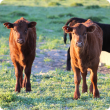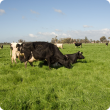Livestock biosecurity
The Department of Agriculture and Food, Western Australia’s Livestock Biosecurity Program is part of the national animal health framework that underpins and enhances Australia’s and Western Australia’s (WA) market access for animals and animal products.
The value of Australia’s export of animals and animal products relies on being able to maintain and demonstrate WA’s excellent animal health and residue-safe food status, a comprehensive livestock traceability system, regulated inter-state and intra-state movement to manage pest and diseases and industry supported disease control programs.
The Livestock Biosecurity Program manages a number of regulatory activities to support stock identification and traceability, disease surveillance, animal movement requirements and preparedness to respond to diseases such as foot and mouth disease and bovine spongiform encephalopathy (BSE). The consequences of these diseases are rated as being catastrophic to the Australian economy, and diseases such as H5N1 avian influenza and rabies may cause death in humans.
Additionally the program regulates activities to protect human health via food safety regulatory activities, chemical management and by monitoring for emerging zoonoses - diseases that can be transmitted from animals to humans.
Early detection of any significant animal disease incursion is essential to minimise the impact on the economy, the community and primary production. Any delay in detection would mean eradication and/or control will be considerably more difficult and expensive or, in the worst case scenario, may not be feasible at all.
Articles
Filter by search
Filter by topic
- (-) Remove Beef cattle filter Beef cattle
- Livestock species (4) Apply Livestock species filter
- Pests, weeds & diseases (4) Apply Pests, weeds & diseases filter
- Livestock disease surveillance (4) Apply Livestock disease surveillance filter
- Livestock health & diseases (4) Apply Livestock health & diseases filter
- (-) Remove Dairy cattle filter Dairy cattle
- (-) Remove Livestock management filter Livestock management
- Diseases (4) Apply Diseases filter
- Livestock & animals (4) Apply Livestock & animals filter
- Management & reproduction (3) Apply Management & reproduction filter
- Goats (2) Apply Goats filter
- Sheep (2) Apply Sheep filter
- Pigs (1) Apply Pigs filter
- Horses (1) Apply Horses filter





